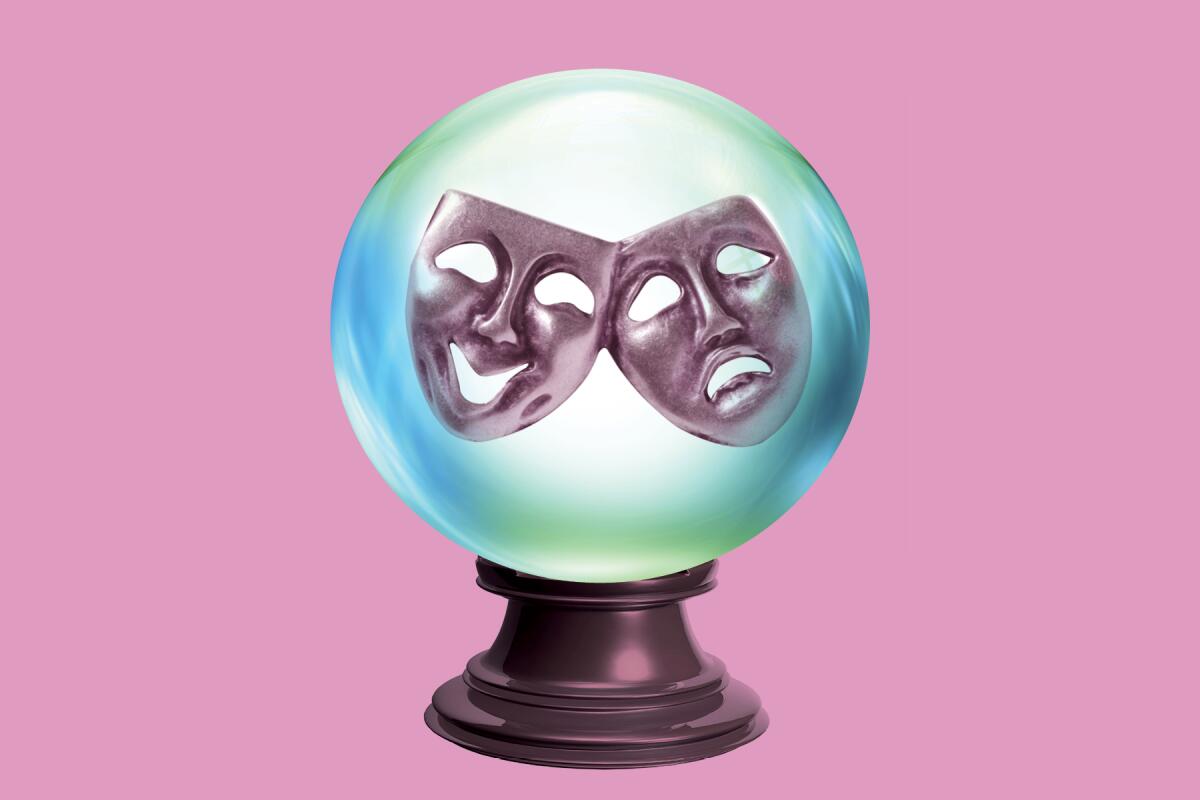Calendar Feedback: Theater after the Pandemic

- Share via
Regarding “Theater After the Pandemic: Not Like it Was. Better” by Charles McNulty [May 31]: There is much talk about when theaters can reopen as the coronavirus still lingers among us. Both live theater and movie theaters have to be concerned with audience members infecting one another. But there is one distinct difference between a movie theater and live theater as far as safety is concerned. In a movie theater performers cannot infect the audience, but performers can infect the audience in live theater. Loud talking and singing from the stage can quickly spread the virus.
Two possible solutions: Have the actors wear masks on stage. There is a long tradition in the theater for wearing masks. I am sure a clever makeup artist could paint the masks in such a way to indicate the character the actor is playing.
Another way is to have the dialogue recorded and the actors silently mouth their words.
William Bergfeldt
Hollywood
::
Surely theater to be made live again must be revitalized and made for the many, rather than for only those that are able to purchase a pricey ticket. A subsidized theater industry such as seen in England would be a giant step forward, as would a program of universal healthcare.
And while much of theater is artifice and illusion, the brilliant Patti LuPone makes an important point: Theaters must emphasize cleanliness. Theater dressing rooms and backstage entrances are, as LuPone emphasizes, nothing short of petri dishes—dank, dirty and unacceptable in this grave age of contagion.
Ben Miles
Huntington Beach
The writer is the theater critic for the Beachcomber Newspaper in Long Beach.
A new perspective for Beckett
Theater critic Charles McNulty’s column [“Beckett Wrote it Out for You,” May 26] is one of the most brilliant pieces of journalism related to the arts I’ve ever read.
I’ve been a Beckett fan for decades and have seen every play by Beckett performed, most more than once. Yet, I felt today as if I were seeing the plays described for the first time.
I can’t thank McNulty enough for this revelatory piece and I thank The Times for continuing to share McNulty’s comments and perspective with its readers.
Marta Vago
Santa Monica
::
Do not ever let go of Charles McNulty. His article confirms his value and worth. Perseverance in the time of COVID-19 is just what Beckett was writing about.
Also, please ask Chris Erskine to come back.
Mary Collier
Fullerton
A versatile actress
Regarding Lorraine Ali’s interview with Juliette Lewis “Oh, That was a Juliette Lewis Role” [May 27]: I so appreciate every Juliette Lewis role she gets. Like it or not, when she appears on screen you’re almost guaranteed an uncontrollable and energetic rambling on and edgy performance that only she can bring to an appearance.
I rank her right there with Meryl Streep and Jessica Lange, who equally use their personas to bring special excitement to every performance.
Yes, more Juliette Lewis please.
Conrad Angel Corral
Cathedral City
Feminism may have lost the battle but won the war
Regarding Mary McNamara’s wonderful “Women Versus Women: Tough Watch for This Former Ms. Staffer” [May 25]: McNamara, one of my favorite cultural journalists working today, did not disappoint me with this thorough and nuanced evaluation of “Mrs. America,” a truly top-notch show, but with one caveat.
McNamara orients the entire article around the “failure” of feminism, as proven by the defeat of the ERA and her argument that “the women’s movement is shoved increasingly to the sidelines.” These are both very strange characterizations in view of the massive impact feminism and the women’s movement have had on U.S. society. Lowering, but not fully fixing, the wage gap; improving women’s chances in the political arena; adding women’s voices to key cultural forms and discourses. Fifty years ago one could not imagine “The Squad” or the heavy representation women have in academia, albeit often at lower paid adjunct levels.
Of course we have not solved gender inequality. But it’s seriously misleading to suggest that the women’s movement had no positive impact or was/is a failure. I was there in D.C. in January 2017 with my daughter and my pussy hat. That was not failure.
That said, one of the most wonderful things about “Mrs. America,” as McNamara points out, is that it refuses to gloss over the internal battles and exclusions — most notably of Black women and lesbians in the 1970s (as well, on the west coast, Latinx and other women of color). Fortunately many of the most important voices from a deep history of this country are now recognized as those of women of color, lesbians, queers, and trans women—from Sojourner Truth to Audre Lorde to Dolores Huerta to Laverne Cox to Janelle Monae and beyond.
The failure to pass the ERA is not a failure overall but was galvanizing for feminists coming of age in the 1980s and 1990s. It pissed me off, and made me the feminist I am.
Amelia Jones
Los Angeles
::
McNamara’s “Mrs. America” [column] is simply one of most endearing and thoughtful stories about the “bravest” show in the history of TV.
Wonderful humanist insights abound in this nine-hour series in which the heroes lose.
Jim Gordon
San Diego
A real nightmare for radio DJs
There is one very frightening element of the movie “The Vast of Night” that the article by Mark Olsen [“‘Extraordinary’ Level of Craft,” May 31] and Justin Chang’s review [“1950s Sci-Fi Paranoia in Fine Form,” May 28] failed to mention.
This was the hero’s nonchalance at leaving the control room while the record was playing without some alternate programming while he went out of the station. It is true, however, that this would only be frightening to a certain segment of the audience: those who have worked as disc jockeys at small radio stations like the one depicted in the film.
It was years ago that I worked in radio but to this day I still have nightmares that I’m walking down the street and suddenly think: “Oh my gosh, the record is about to end and I’m not there!”
I’m sure many an old time DJ were quaking in their boots when they saw him heading outside while his show was still on.
Jonathan Mumm
Twin Peaks
More to Read
The complete guide to home viewing
Get Screen Gab for everything about the TV shows and streaming movies everyone’s talking about.
You may occasionally receive promotional content from the Los Angeles Times.







